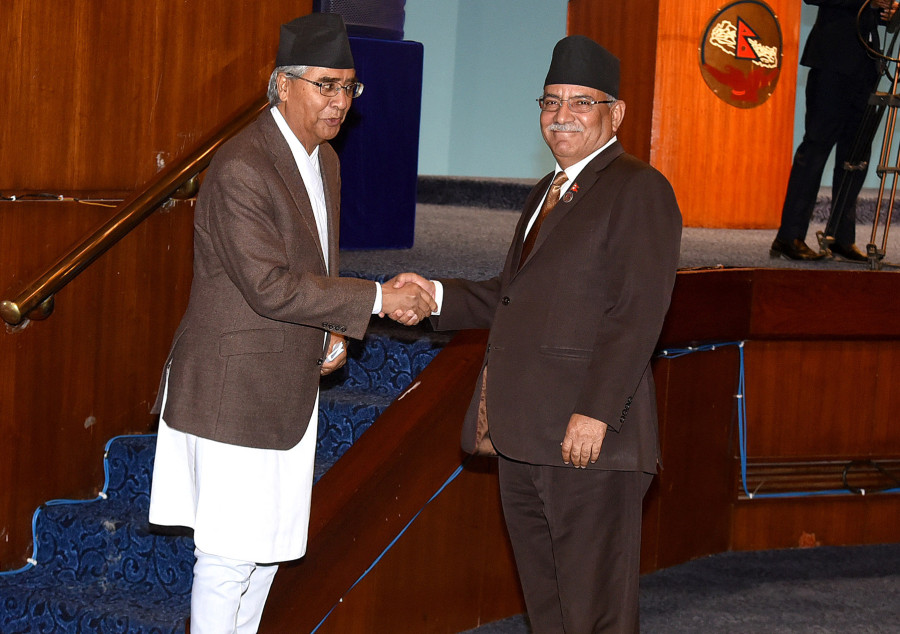Politics
Congress allows Sapkota to run unopposed for Speaker, showing there’s a larger game afoot
Party insiders say that Agni Sapkota for Speaker is part of a larger deal among Deuba, Dahal and Oli that includes transitional justice and the Constitutional Council.
Anil Giri
The primary opposition Nepali Congress did not field any candidate for Speaker on Tuesday to challenge the Nepal Communist Party’s candidate Agni Sapkota, paving the way for the ruling party leader’s election to the post unopposed. The party is also unlikely to file candidacy for the post of deputy Speaker.
Ruling party co-chairs KP Sharma Oli and Pushpa Kamal Dahal had reached a deal on Sunday to put up Sapkota for the Speaker of the House of Representatives after month-long negotiations. That deal came a day after Oli, Dahal and Congress President Sher Bahadur Deuba decided on officials for the two transitional justice commissions that are tasked with investigating conflict-era cases.
Now that the Congress has allowed Sapkota, who faces a murder charge for a conflict-era killing, to get elected unopposed, party insiders say is part of a larger deal between Oli, Dahal and Deuba.
Congress leaders admit that Deuba made a concession in return for a stronger say on the Constitutional Council, where he is a member in his capacity as the leader of the opposition. The Constitutional Council is an important body that appoints ambassadors and officials to constitutional bodies.
Ram Chandra Poudel, a senior Congress leader, affirmed that a deal had been struck among Deuba, Oli and Dahal regarding the Speaker’s post and the transitional justice bodies.
“I had a meeting scheduled with Deuba to discuss ways to make the transitional justice process more credible,” Poudel told the Post. “But instead, he asked me if we should file candidacy for Speaker. I told him we should, but he declined, saying we have to make an agreement with the ruling party for various appointments.”
Constitutional Council meetings in the past have been deferred several times after Deuba failed to show up. On one occasion, it decided on a few appointments in his absence, prompting the Congress party to boycott a hearing committee meeting.
Apart from a deal on appointments, there are other pressing concerns due to which Deuba is not opposed to the ruling party, say insiders.
When it comes to the transitional justice process, Deuba and Dahal are the major parties—one as leader of the government during the insurgency and the other as supreme commander of the Maoist army.
But according to one Congress leader, any such deal between the ruling and opposition parties will not bode well for the drawn-out transitional justice process.
“The peace process is a special political situation. That, however, does not mean ignoring war-era serious crimes and absolving the guilty,” said Gagan Thapa, a Congress central committee member. “The NCP co-chair’s statement, ruling party’s decision and the opposition’s support are sinister. There shouldn’t be any attempt to halt the judicial process just because someone holds a special position.”
Oli, according to ruling party leaders, had largely left the transitional justice issue to Dahal and Deuba.
After Saturday’s meeting between Oli, Dahal and Deuba, a recommendation committee swiftly forwarded candidates for the Truth and Reconciliation Commission and the Commission of Investigation on Enforced Disappeared Persons. All 10 names were suggested by the parties.
The ruling and opposition parties have also reached a deal on amending the Transitional Justice Act, at least two leaders familiar with developments told the Post.
Deuba then seized the opportunity to also make a deal on appointments through the Constitutional Council, according to Thapa. Deuba cashed in on the recent friction between Oli and Dahal in the ruling party, he said.
Oli is now in a bid to give the deputy Speaker’s post to the Rastriya Janata Party, as a precursor to the Madhes-based party’s inclusion in government.
But Congress leaders say negotiations are ongoing between Dahal and Deuba to get one of their party members elected as deputy Speaker.
Leaders from both ruling and opposition parties said they were expecting more manoeuvres in the days to come, as cracks have already started to appear in the Janata Party, which on Tuesday supported Sapkota’s nomination for Speaker.
The Janata Party’s presidium is divided with one section refusing to join the Oli government until a number of its demands are met. Dahal, meanwhile, wants to prevent the Janata Party from joining the Oli government as he wants to take the Congress on board with the post of deputy Speaker. In return, Deuba had suggested that Dahal woo Poudel so that he would not create obstacles during recommendations to the constitutional bodies, said the Nepali Congress leader.
Minendra Rijal, a Congress leader, however, said he could not say at this point of time if the ruling party would agree on giving the post of deputy Speaker to the opposition.
Ruling party spokesperson Narayan Kaji Shrestha, who has close relations with Dahal, said that given the myriad challenges the country is facing, there was a need for the ruling and opposition parties to agree on some pressing issues.
“There was some understanding between ruling and opposition parties’ leaders during negotiations over transitional justice,” Shrestha told the Post. “We agreed on appointments to the two transitional justice bodies and we have also agreed on amendments to the Transitional Justice Act.”
According to Shrestha, the ruling and opposition parties have also agreed to work together in the future as well.
Political observers say that the primary opposition allowing Sapkota to get elected unopposed does indicate that there is a give-and-take between the ruling and opposition parties.
“In principle, the Nepali Congress should have filed its candidacy, even if it knows it lacks numbers to win, just to show that it is in opposition,” said Shreekrishna Aniruddh Gautam, a political commentator. “As that is not happening, it shows that the ruling and opposition parties are working together.”




 18.12°C Kathmandu
18.12°C Kathmandu














